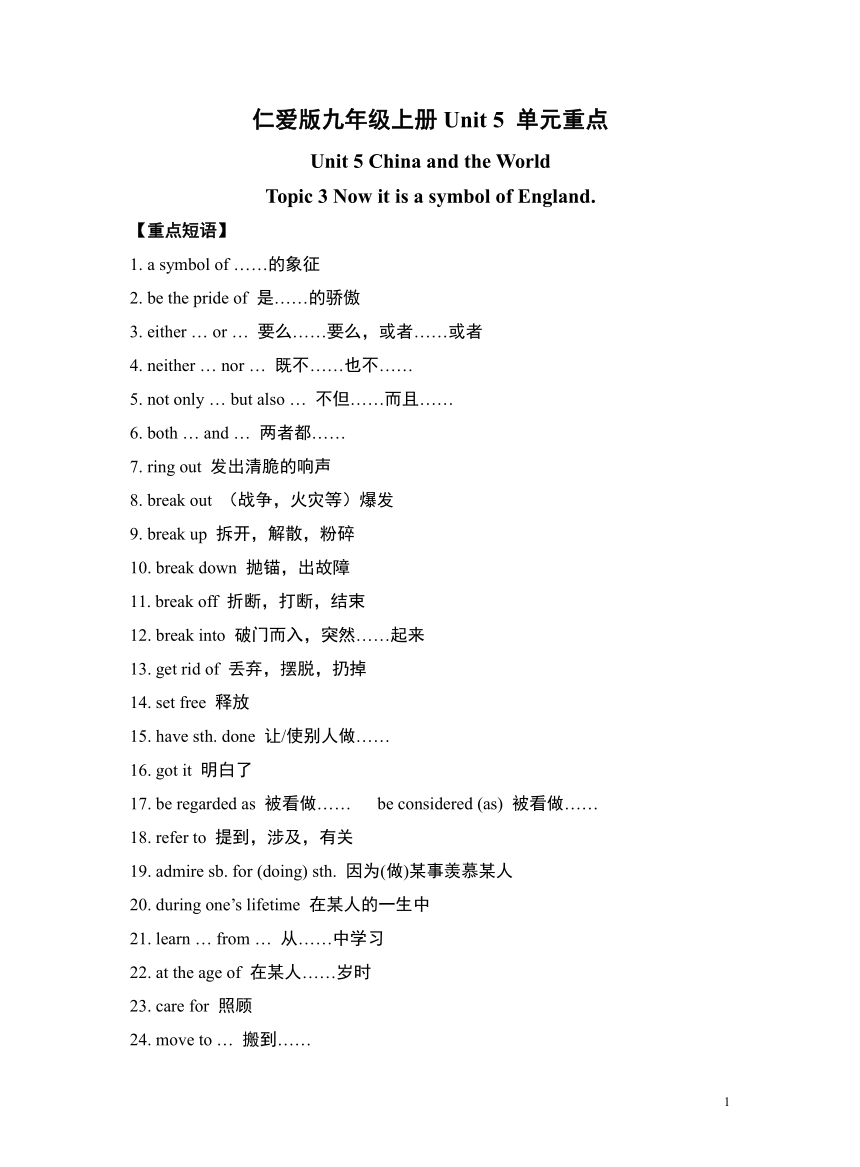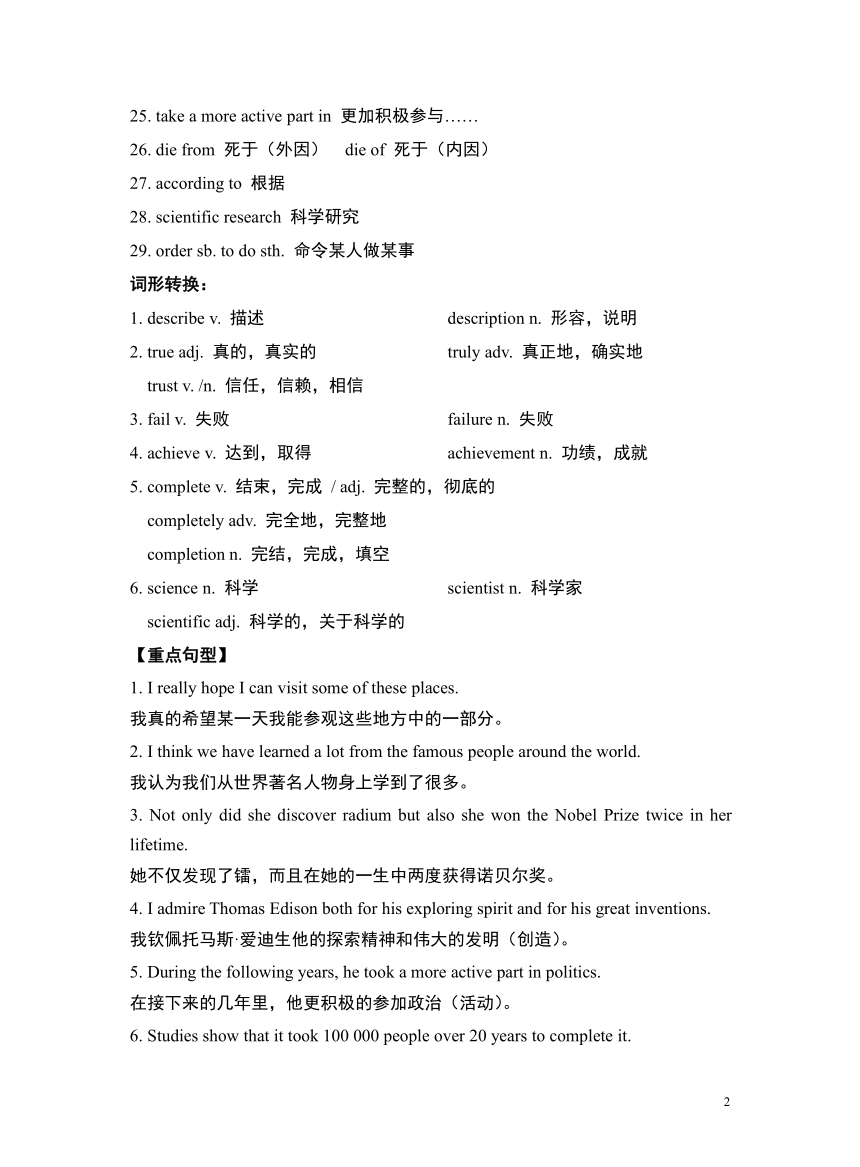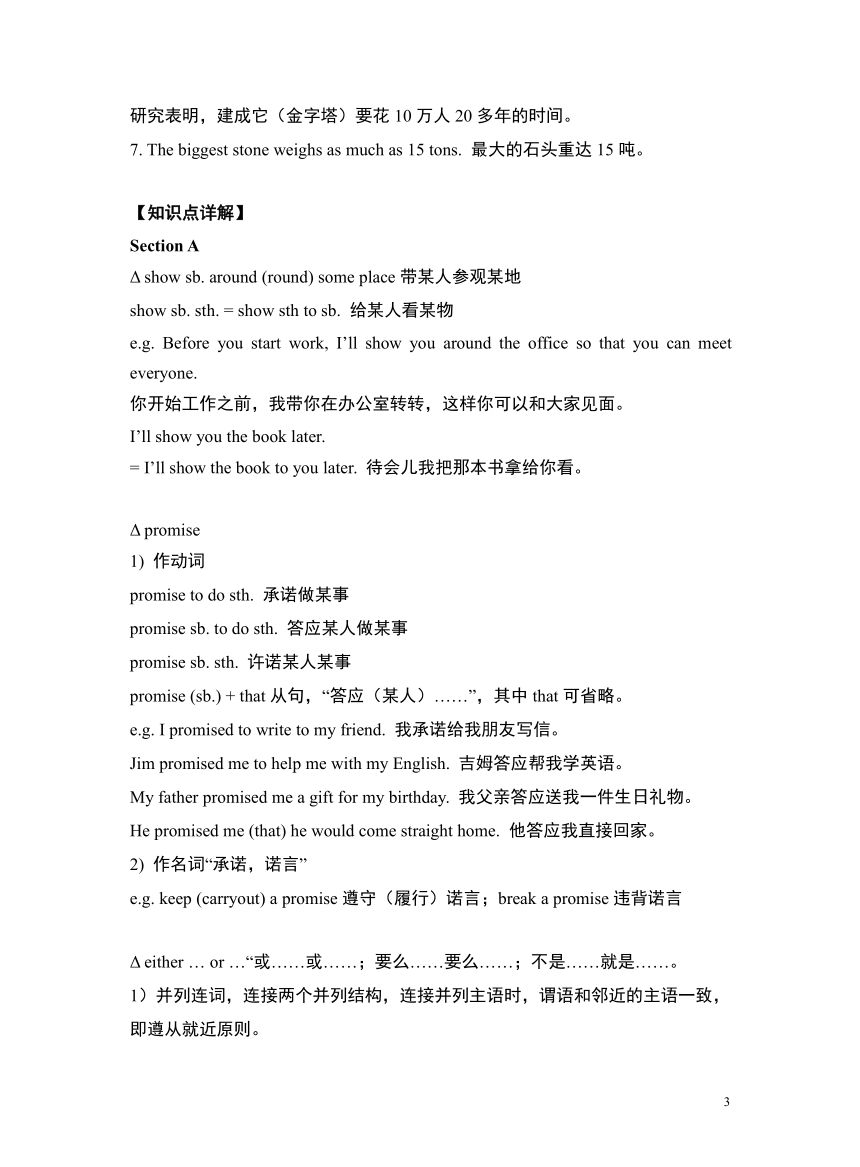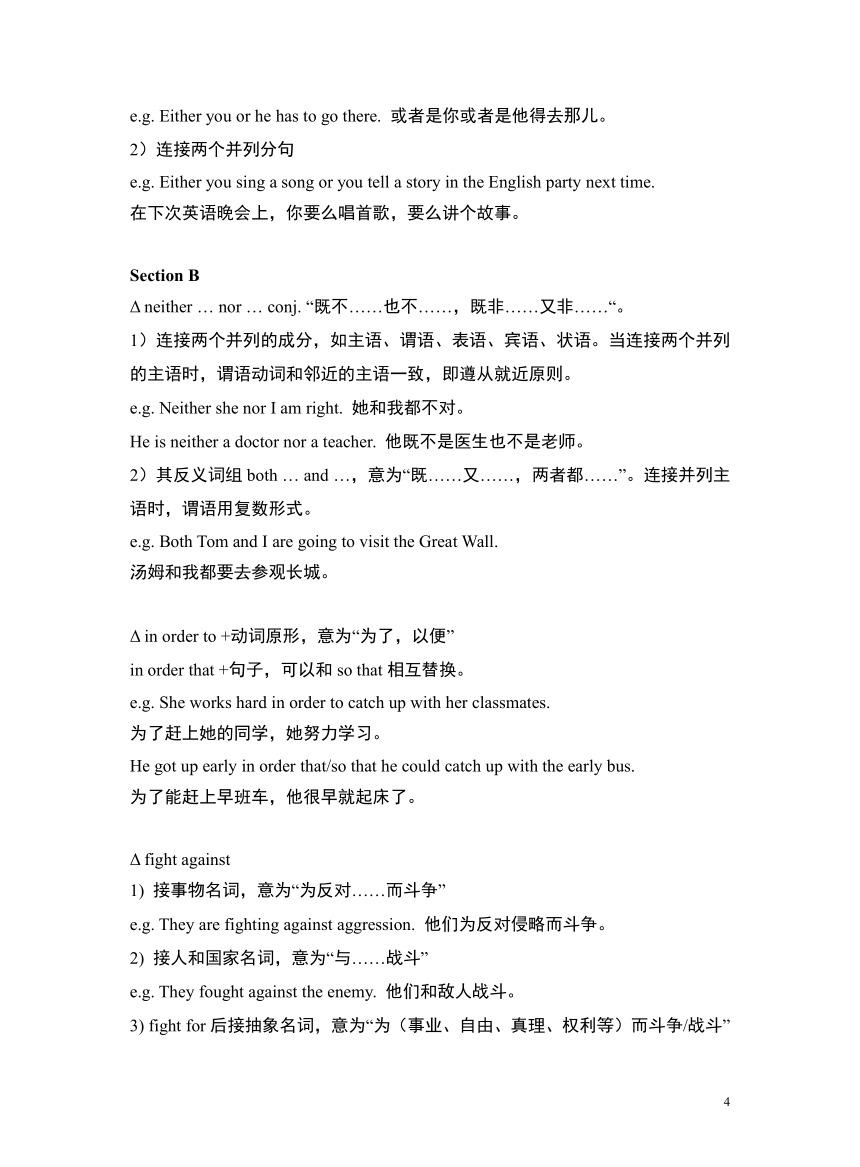仁爱版英语九年级下册Unit 5 China and the world Topic 3 单元重点及练习(含答案)
文档属性
| 名称 | 仁爱版英语九年级下册Unit 5 China and the world Topic 3 单元重点及练习(含答案) |

|
|
| 格式 | docx | ||
| 文件大小 | 28.3KB | ||
| 资源类型 | 教案 | ||
| 版本资源 | 仁爱科普版 | ||
| 科目 | 英语 | ||
| 更新时间 | 2024-02-06 12:24:07 | ||
图片预览




文档简介
仁爱版九年级上册Unit 5 单元重点
Unit 5 China and the World
Topic 3 Now it is a symbol of England.
【重点短语】
1. a symbol of ……的象征
2. be the pride of 是……的骄傲
3. either … or … 要么……要么,或者……或者
4. neither … nor … 既不……也不……
5. not only … but also … 不但……而且……
6. both … and … 两者都……
7. ring out 发出清脆的响声
8. break out (战争,火灾等)爆发
9. break up 拆开,解散,粉碎
10. break down 抛锚,出故障
11. break off 折断,打断,结束
12. break into 破门而入,突然……起来
13. get rid of 丢弃,摆脱,扔掉
14. set free 释放
15. have sth. done 让/使别人做……
16. got it 明白了
17. be regarded as 被看做…… be considered (as) 被看做……
18. refer to 提到,涉及,有关
19. admire sb. for (doing) sth. 因为(做)某事羡慕某人
20. during one’s lifetime 在某人的一生中
21. learn … from … 从……中学习
22. at the age of 在某人……岁时
23. care for 照顾
24. move to … 搬到……
25. take a more active part in 更加积极参与……
26. die from 死于(外因) die of 死于(内因)
27. according to 根据
28. scientific research 科学研究
29. order sb. to do sth. 命令某人做某事
词形转换:
1. describe v. 描述 description n. 形容,说明
2. true adj. 真的,真实的 truly adv. 真正地,确实地
trust v. /n. 信任,信赖,相信
3. fail v. 失败 failure n. 失败
4. achieve v. 达到,取得 achievement n. 功绩,成就
5. complete v. 结束,完成 / adj. 完整的,彻底的
completely adv. 完全地,完整地
completion n. 完结,完成,填空
6. science n. 科学 scientist n. 科学家
scientific adj. 科学的,关于科学的
【重点句型】
1. I really hope I can visit some of these places.
我真的希望某一天我能参观这些地方中的一部分。
2. I think we have learned a lot from the famous people around the world.
我认为我们从世界著名人物身上学到了很多。
3. Not only did she discover radium but also she won the Nobel Prize twice in her lifetime.
她不仅发现了镭,而且在她的一生中两度获得诺贝尔奖。
4. I admire Thomas Edison both for his exploring spirit and for his great inventions.
我钦佩托马斯·爱迪生他的探索精神和伟大的发明(创造)。
5. During the following years, he took a more active part in politics.
在接下来的几年里,他更积极的参加政治(活动)。
6. Studies show that it took 100 000 people over 20 years to complete it.
研究表明,建成它(金字塔)要花10万人20多年的时间。
7. The biggest stone weighs as much as 15 tons. 最大的石头重达15吨。
【知识点详解】
Section A
Δ show sb. around (round) some place带某人参观某地
show sb. sth. = show sth to sb. 给某人看某物
e.g. Before you start work, I’ll show you around the office so that you can meet everyone.
你开始工作之前,我带你在办公室转转,这样你可以和大家见面。
I’ll show you the book later.
= I’ll show the book to you later. 待会儿我把那本书拿给你看。
Δ promise
1) 作动词
promise to do sth. 承诺做某事
promise sb. to do sth. 答应某人做某事
promise sb. sth. 许诺某人某事
promise (sb.) + that从句,“答应(某人)……”,其中that可省略。
e.g. I promised to write to my friend. 我承诺给我朋友写信。
Jim promised me to help me with my English. 吉姆答应帮我学英语。
My father promised me a gift for my birthday. 我父亲答应送我一件生日礼物。
He promised me (that) he would come straight home. 他答应我直接回家。
2) 作名词“承诺,诺言”
e.g. keep (carryout) a promise遵守(履行)诺言;break a promise违背诺言
Δ either … or …“或……或……;要么……要么……;不是……就是……。
1)并列连词,连接两个并列结构,连接并列主语时,谓语和邻近的主语一致,即遵从就近原则。
e.g. Either you or he has to go there. 或者是你或者是他得去那儿。
2)连接两个并列分句
e.g. Either you sing a song or you tell a story in the English party next time.
在下次英语晚会上,你要么唱首歌,要么讲个故事。
Section B
Δ neither … nor … conj. “既不……也不……,既非……又非……“。
1)连接两个并列的成分,如主语、谓语、表语、宾语、状语。当连接两个并列的主语时,谓语动词和邻近的主语一致,即遵从就近原则。
e.g. Neither she nor I am right. 她和我都不对。
He is neither a doctor nor a teacher. 他既不是医生也不是老师。
2)其反义词组both … and …,意为“既……又……,两者都……”。连接并列主语时,谓语用复数形式。
e.g. Both Tom and I are going to visit the Great Wall.
汤姆和我都要去参观长城。
Δ in order to +动词原形,意为“为了,以便”
in order that +句子,可以和so that相互替换。
e.g. She works hard in order to catch up with her classmates.
为了赶上她的同学,她努力学习。
He got up early in order that/so that he could catch up with the early bus.
为了能赶上早班车,他很早就起床了。
Δ fight against
1) 接事物名词,意为“为反对……而斗争”
e.g. They are fighting against aggression. 他们为反对侵略而斗争。
2) 接人和国家名词,意为“与……战斗”
e.g. They fought against the enemy. 他们和敌人战斗。
3) fight for后接抽象名词,意为“为(事业、自由、真理、权利等)而斗争/战斗”
e.g. They are fighting for freedom. 他们在为自由而战。
Δ win
1) 作vt. “打赢,打胜”。其后常接比赛、战斗、奖品等作宾语。
e.g. We have won the football match against Class 1. 我们赢了和一班的那场足球赛。
2) 作vi. “胜,赢,得胜”
e.g. We have won in the school sports meeting. 在校运动会中我们胜利了。
Δ in memory of sb. /sth. 为了纪念某人/物;作为对某人/物的纪念
e.g. He set up the school in memory of his dead wife. 他创办了这所学校以纪念他已故的妻子。
Section C
Δ China is the home of tea, which has more than 4000 years of history. 中国是茶的故乡,有4000多年的历史。
注:which has more than 4000 years of history. 是由which引导的定语从句,修饰先行词tea,which在从句中作主语,而且定语从句与先行词tea之间用逗号隔开,这种定语从句在句中起补充说明的作用,去掉之后意思依然清楚,此时的which不可用that代替,这种定语从句称为非限制性定语从句;而前面两个话题所学的定语从句称为限制性定语从句。文中类似的句子还有:
The Russians call it “cha’i”, which sounds like“chaye” (tea leaves) as it is pronounced in northern China. 俄国人称茶为“cha’i”,听起来很像中国北方人发的“chaye”(茶叶)。
Δ throughout是介词,意为“遍及,在……各处”,相当于allover/around。
e.g. People throughout the world love peace. 全世界人民都热爱和平。
Δ along with sb. /sth. “与……一起,与……同样地;除……以外(还)”。其谓语动词的单复数不受所接人或事物的数的影响,而由前面的主语决定。
e.g. Helen, along with her brothers, has gone abroad. 海伦和她的弟弟们都出国了。
Δ dismiss解雇,开除,把(某人)打发走;解散。dismiss sb. 解雇/开除某人
e.g. Peter was dismissed because he was late for work. 彼得因为上班迟到而被解雇了。
Δ the streets to …“通往某地的街道”。注:to在这里作介词,表示“往;到;向”。类似的用法:the answer to the question这个问题的答案;the key to the door门的钥匙
Section D
Δ depend on
1) 依靠;依赖;相信
e.g. Children depend on their parents for what they need.
孩子们依靠父母供给他们所需的一切。
2) 取决于,依……而定
e.g. Your success depends on your hard work. 你的成功取决于你的辛勤劳动。
Δ at the end of +时间名词、地点名词或其他物品,意为“在……末端,在……的尽头”。学过的与end有关的词组有:by the end of到……末为止,在……以前;in the end最后,终于;end with …以……结束。
e.g. You will see a cinema at the end of the street.
在街的尽头你将会看见一家电影院。
Δ spread v. “传开,传播,蔓延”。后常跟to, through等介词,spread的过去式和过去分词与原形一样,都是spread。
e.g. Buddhism spread to China from India. 佛教从印度传入中国。
单元习题
一、单项选择
1. Manual of Youth, the song of TF boys, is ________ the youth for the young people today.
A. a symbol of B. a kind of C. a lot of D. a number of
2. —What would you like for dinner
—Either noodles or rice _____ OK.
A. is B. are C. be
3. Neither I nor he ________ compared the price of the PC, so ________ he ________ I decided to know more before buying it.
A. have; not only; but also B. has; both; and
C. hasn’t; either; or D. haven’t; neither; nor
4. A quarrel ________ between the couple. It made their son break away from his family.
A. broke into B. broke in C. broke down D. broke out
5. They use the word “night owl” to refer ________ those who stay up late ________ night.
A. to; of B. at; for C. at; to D. to; at
6. Lucy often helps me ________ my English. I can learn a lot ________ her.
A. with, to B. of, from C. with, from
7. My birthday is coming. My parents promise ________ a new watch for me.
A. buy B. to buy C. buying D. buys
8. ________ improve my English, I would like to find a penfriend in England.
A. In order that B. In order to C. Thanks for D. Thanks to
9. The doctor gave the woman a completely physical examination, yet he still couldn’t think out one possible ________ for the pain.
A. expression B. exhibition C. explanation D. expectation
10. —I know that _______ Jenny ________ Lucy is studying Sichuan culture now.
—Yes, and they find it rich and amazing.
A. neither … nor B. both … and C. not only … but also
(参考答案:AABDD CBBCC)
1
Unit 5 China and the World
Topic 3 Now it is a symbol of England.
【重点短语】
1. a symbol of ……的象征
2. be the pride of 是……的骄傲
3. either … or … 要么……要么,或者……或者
4. neither … nor … 既不……也不……
5. not only … but also … 不但……而且……
6. both … and … 两者都……
7. ring out 发出清脆的响声
8. break out (战争,火灾等)爆发
9. break up 拆开,解散,粉碎
10. break down 抛锚,出故障
11. break off 折断,打断,结束
12. break into 破门而入,突然……起来
13. get rid of 丢弃,摆脱,扔掉
14. set free 释放
15. have sth. done 让/使别人做……
16. got it 明白了
17. be regarded as 被看做…… be considered (as) 被看做……
18. refer to 提到,涉及,有关
19. admire sb. for (doing) sth. 因为(做)某事羡慕某人
20. during one’s lifetime 在某人的一生中
21. learn … from … 从……中学习
22. at the age of 在某人……岁时
23. care for 照顾
24. move to … 搬到……
25. take a more active part in 更加积极参与……
26. die from 死于(外因) die of 死于(内因)
27. according to 根据
28. scientific research 科学研究
29. order sb. to do sth. 命令某人做某事
词形转换:
1. describe v. 描述 description n. 形容,说明
2. true adj. 真的,真实的 truly adv. 真正地,确实地
trust v. /n. 信任,信赖,相信
3. fail v. 失败 failure n. 失败
4. achieve v. 达到,取得 achievement n. 功绩,成就
5. complete v. 结束,完成 / adj. 完整的,彻底的
completely adv. 完全地,完整地
completion n. 完结,完成,填空
6. science n. 科学 scientist n. 科学家
scientific adj. 科学的,关于科学的
【重点句型】
1. I really hope I can visit some of these places.
我真的希望某一天我能参观这些地方中的一部分。
2. I think we have learned a lot from the famous people around the world.
我认为我们从世界著名人物身上学到了很多。
3. Not only did she discover radium but also she won the Nobel Prize twice in her lifetime.
她不仅发现了镭,而且在她的一生中两度获得诺贝尔奖。
4. I admire Thomas Edison both for his exploring spirit and for his great inventions.
我钦佩托马斯·爱迪生他的探索精神和伟大的发明(创造)。
5. During the following years, he took a more active part in politics.
在接下来的几年里,他更积极的参加政治(活动)。
6. Studies show that it took 100 000 people over 20 years to complete it.
研究表明,建成它(金字塔)要花10万人20多年的时间。
7. The biggest stone weighs as much as 15 tons. 最大的石头重达15吨。
【知识点详解】
Section A
Δ show sb. around (round) some place带某人参观某地
show sb. sth. = show sth to sb. 给某人看某物
e.g. Before you start work, I’ll show you around the office so that you can meet everyone.
你开始工作之前,我带你在办公室转转,这样你可以和大家见面。
I’ll show you the book later.
= I’ll show the book to you later. 待会儿我把那本书拿给你看。
Δ promise
1) 作动词
promise to do sth. 承诺做某事
promise sb. to do sth. 答应某人做某事
promise sb. sth. 许诺某人某事
promise (sb.) + that从句,“答应(某人)……”,其中that可省略。
e.g. I promised to write to my friend. 我承诺给我朋友写信。
Jim promised me to help me with my English. 吉姆答应帮我学英语。
My father promised me a gift for my birthday. 我父亲答应送我一件生日礼物。
He promised me (that) he would come straight home. 他答应我直接回家。
2) 作名词“承诺,诺言”
e.g. keep (carryout) a promise遵守(履行)诺言;break a promise违背诺言
Δ either … or …“或……或……;要么……要么……;不是……就是……。
1)并列连词,连接两个并列结构,连接并列主语时,谓语和邻近的主语一致,即遵从就近原则。
e.g. Either you or he has to go there. 或者是你或者是他得去那儿。
2)连接两个并列分句
e.g. Either you sing a song or you tell a story in the English party next time.
在下次英语晚会上,你要么唱首歌,要么讲个故事。
Section B
Δ neither … nor … conj. “既不……也不……,既非……又非……“。
1)连接两个并列的成分,如主语、谓语、表语、宾语、状语。当连接两个并列的主语时,谓语动词和邻近的主语一致,即遵从就近原则。
e.g. Neither she nor I am right. 她和我都不对。
He is neither a doctor nor a teacher. 他既不是医生也不是老师。
2)其反义词组both … and …,意为“既……又……,两者都……”。连接并列主语时,谓语用复数形式。
e.g. Both Tom and I are going to visit the Great Wall.
汤姆和我都要去参观长城。
Δ in order to +动词原形,意为“为了,以便”
in order that +句子,可以和so that相互替换。
e.g. She works hard in order to catch up with her classmates.
为了赶上她的同学,她努力学习。
He got up early in order that/so that he could catch up with the early bus.
为了能赶上早班车,他很早就起床了。
Δ fight against
1) 接事物名词,意为“为反对……而斗争”
e.g. They are fighting against aggression. 他们为反对侵略而斗争。
2) 接人和国家名词,意为“与……战斗”
e.g. They fought against the enemy. 他们和敌人战斗。
3) fight for后接抽象名词,意为“为(事业、自由、真理、权利等)而斗争/战斗”
e.g. They are fighting for freedom. 他们在为自由而战。
Δ win
1) 作vt. “打赢,打胜”。其后常接比赛、战斗、奖品等作宾语。
e.g. We have won the football match against Class 1. 我们赢了和一班的那场足球赛。
2) 作vi. “胜,赢,得胜”
e.g. We have won in the school sports meeting. 在校运动会中我们胜利了。
Δ in memory of sb. /sth. 为了纪念某人/物;作为对某人/物的纪念
e.g. He set up the school in memory of his dead wife. 他创办了这所学校以纪念他已故的妻子。
Section C
Δ China is the home of tea, which has more than 4000 years of history. 中国是茶的故乡,有4000多年的历史。
注:which has more than 4000 years of history. 是由which引导的定语从句,修饰先行词tea,which在从句中作主语,而且定语从句与先行词tea之间用逗号隔开,这种定语从句在句中起补充说明的作用,去掉之后意思依然清楚,此时的which不可用that代替,这种定语从句称为非限制性定语从句;而前面两个话题所学的定语从句称为限制性定语从句。文中类似的句子还有:
The Russians call it “cha’i”, which sounds like“chaye” (tea leaves) as it is pronounced in northern China. 俄国人称茶为“cha’i”,听起来很像中国北方人发的“chaye”(茶叶)。
Δ throughout是介词,意为“遍及,在……各处”,相当于allover/around。
e.g. People throughout the world love peace. 全世界人民都热爱和平。
Δ along with sb. /sth. “与……一起,与……同样地;除……以外(还)”。其谓语动词的单复数不受所接人或事物的数的影响,而由前面的主语决定。
e.g. Helen, along with her brothers, has gone abroad. 海伦和她的弟弟们都出国了。
Δ dismiss解雇,开除,把(某人)打发走;解散。dismiss sb. 解雇/开除某人
e.g. Peter was dismissed because he was late for work. 彼得因为上班迟到而被解雇了。
Δ the streets to …“通往某地的街道”。注:to在这里作介词,表示“往;到;向”。类似的用法:the answer to the question这个问题的答案;the key to the door门的钥匙
Section D
Δ depend on
1) 依靠;依赖;相信
e.g. Children depend on their parents for what they need.
孩子们依靠父母供给他们所需的一切。
2) 取决于,依……而定
e.g. Your success depends on your hard work. 你的成功取决于你的辛勤劳动。
Δ at the end of +时间名词、地点名词或其他物品,意为“在……末端,在……的尽头”。学过的与end有关的词组有:by the end of到……末为止,在……以前;in the end最后,终于;end with …以……结束。
e.g. You will see a cinema at the end of the street.
在街的尽头你将会看见一家电影院。
Δ spread v. “传开,传播,蔓延”。后常跟to, through等介词,spread的过去式和过去分词与原形一样,都是spread。
e.g. Buddhism spread to China from India. 佛教从印度传入中国。
单元习题
一、单项选择
1. Manual of Youth, the song of TF boys, is ________ the youth for the young people today.
A. a symbol of B. a kind of C. a lot of D. a number of
2. —What would you like for dinner
—Either noodles or rice _____ OK.
A. is B. are C. be
3. Neither I nor he ________ compared the price of the PC, so ________ he ________ I decided to know more before buying it.
A. have; not only; but also B. has; both; and
C. hasn’t; either; or D. haven’t; neither; nor
4. A quarrel ________ between the couple. It made their son break away from his family.
A. broke into B. broke in C. broke down D. broke out
5. They use the word “night owl” to refer ________ those who stay up late ________ night.
A. to; of B. at; for C. at; to D. to; at
6. Lucy often helps me ________ my English. I can learn a lot ________ her.
A. with, to B. of, from C. with, from
7. My birthday is coming. My parents promise ________ a new watch for me.
A. buy B. to buy C. buying D. buys
8. ________ improve my English, I would like to find a penfriend in England.
A. In order that B. In order to C. Thanks for D. Thanks to
9. The doctor gave the woman a completely physical examination, yet he still couldn’t think out one possible ________ for the pain.
A. expression B. exhibition C. explanation D. expectation
10. —I know that _______ Jenny ________ Lucy is studying Sichuan culture now.
—Yes, and they find it rich and amazing.
A. neither … nor B. both … and C. not only … but also
(参考答案:AABDD CBBCC)
1
同课章节目录
- Unit 5 China and the world
- Topic 1 China attracts millions of tourists from a
- Topic 2 He is really the pride of China.
- Topic 3 Now it is a symbol of England.
- Unit 6 Entertainment and Friendship.
- Topic 1 I would rather watch sports shows than tho
- Topic 2 Who is your favorite character in literatu
- Topic 3 I will remember our friendship forever.
